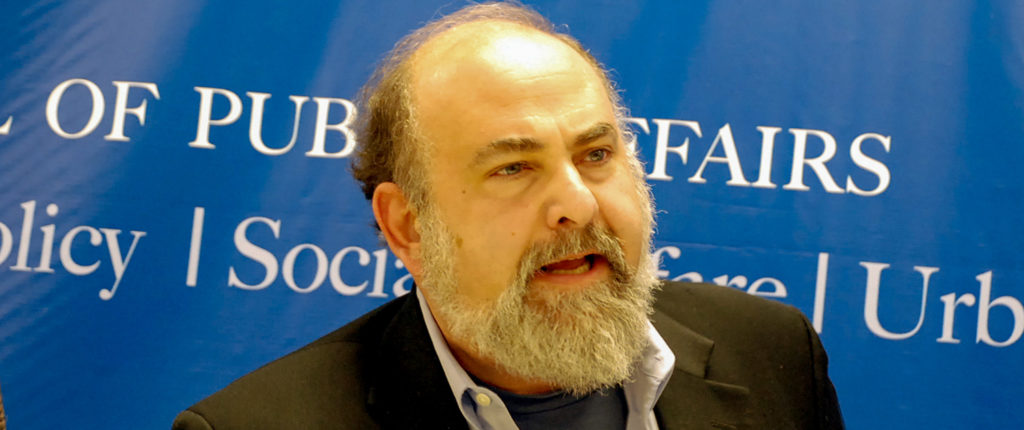Mark A.R. Kleiman, 1951-2019
A great public intellectual, pioneering blogger, and all-around good man is gone.

Mark Kleiman has left us far too soon.
UCLA, where he taught for the bulk of his career, has posted a remembrance.
Mark A.R. Kleiman, emeritus professor of public policy at the UCLA Luskin School of Public Affairs and one of the United States’ pre-eminent experts on drug and crime policy, died July 21 after a long illness. He was 68.
Kleiman’s long list of publications includes his most recent co-authored books, “Marijuana Legalization: What Everyone Needs to Know” (Oxford University Press, 2012) and “Drugs and Drug Policy: What Everyone Needs to Know” (Oxford, 2011), as well as “When Brute Force Fails: How to Have Less Crime and Less Punishment” (Princeton University Press, 2009).
He also worked at the United States Department of Justice, serving as director of the Office of Policy and Management Analysis, Criminal Division, and as the associate director for Drug Enforcement Programs. And he held posts as deputy director for management and director of program analysis for the city of Boston.
“Mark was a rare breed in academia, a truly Renaissance mind,” said Mark Peterson, professor of public policy in the UCLA Luskin School and one of Kleiman’s colleagues. “I quickly realized that he was both the smartest person in the building and among the funniest, with a quick wit that often required educational sophistication to fully grasp.”
Peterson added: “I can say that his network was simply enormous, encompassing friends, colleagues, mentees and protégés, graduate and undergraduate students, media figures, state and federal policymakers, all of whom he helped, he informed, he guided, and he just simply cared about.”
Kleiman also authored numerous journal articles, book chapters, technical reports and policy memos, as well providing articles and commentary for news media and book reviews and for professional publications. He served as editor of the Journal of Drug Policy Analysis and was a referee for numerous professional policy journals. He also was an active blogger on “The Reality-Based Community,” focusing on public policy analysis of the criminal justice system, substance abuse, and drug policy in the United States and abroad.
Kleiman, who was born in Phoenix and grew up in Baltimore, graduated magna cum laude in political science, philosophy and economics from Haverford College. He earned his master’s in public policy and doctorate in public policy at Harvard.
He came to UCLA in 1996 shortly after the founding of the graduate program in public policy in what was then known as the UCLA School of Public Policy and Social Research. He served on the faculty of the Luskin School until retiring in 2015. He later joined the faculty of New York University, where he was affiliated with NYU’s Wagner School and served as director of the crime and justice program at NYU’s Marron Institute of Urban Management.
Prior to UCLA, Kleiman held academic posts at Harvard University’s John F. Kennedy School of Government, and at the University of Rochester. He also served stints as a visiting professor at the Batten School of Leadership and Policy at the University of Virginia, Harvard Law School, and the University of Maryland’s School of Public Policy. He was a visiting fellow at the National Institute of Justice.
In addition, Kleiman served on the National Research Council as a member of the Committee on Law and Justice, and he was chairman of the board of the Los Angeles-based Botec Analysis Corporation, a research and consulting firm that develops solutions to issues in public policy in the areas of crime, justice and drug policy.
“Mark leaves behind a legacy — us,” said former student Brad Rowe, who earned his master’s in public policy in 2013, and who later worked closely with Kleiman. “He was a teacher first and foremost.”
Rowe said that Kleiman was a demanding instructor, but “he could always make you laugh with his ready-made arsenal of anecdotes.”
Rowe, who now teaches a public policy course at UCLA Luskin and serves as the school’s intellectual successor to Kleiman on drug policy, continued, “And, wow, I’ve rarely met someone who so loved seeing justice done.”UCLA was the launching point and incubator for many of Kleiman’s ideas, Rowe recalled. “It was a safe haven where he valued the commitment this group has for thought and action rooted in truth, equality, dignity and public safety.”
Albert Carnesale, UCLA chancellor emeritus and professor emeritus of public policy and mechanical and aerospace engineering, first met his future colleague during Kleiman’s time as a doctoral student at Harvard.
“In addition to being an extraordinary fount of original ideas, deep insights, and rigorous and revealing analyses, he was a devoted mentor to generations of students, a valuable colleague, a caring friend, and a compassionate and effective advocate for fairness and justice,” Carnesale wrote in an email after learning of Kleiman’s death.Former student Jaime Nack, the president of Three Squares Inc. and who graduated with a master’s in public policy in 2002, wrote: “Mark Kleiman was an amazing professor … He truly cared that we mastered the material. He knew it would serve us in life and in our careers.”
—“In memoriam: Mark Kleiman, world-renowned scholar of drug policy and criminal justice reform“
Keith Humphreys reflects on the passing of his friend, colleague, and co-blogger:
Professor Mark Kleiman, the founder of RBC, and a giant in crime and drug policy analysis for decades, passed away this morning after a long illness that he himself had chronicled here. His sister Kelly announced his death on Twitter earlier today, asking that “If you are moved to honor him, please donate to the NYU Transplant Institute, the ACLU, or any Democratic candidate.”
All of us who have written at RBC over the years mourn the loss of our remarkable colleague and friend.
And also on Twitter:
Fellow California blogger and friend Kevin Drum:
To most of the world, Mark was a brilliant criminology scholar with a particular expertise in drug policy. To me, he was a friend and fellow blogger who just happened to also be a brilliant criminology scholar.
Mark began blogging back in 2002, the same as me, and since he taught at UCLA I saw him pretty regularly at get-togethers of one kind or another. He was voluble and opinionated—I’m pretty sure he disapproved of every attorney general ever—but invariably fairminded in his field. He was always helpful when I needed help, and I owe him at least some of the credit for my work on lead and crime. Unlike most other criminologists, he took the lead hypothesis seriously, and that was one of the things that gave me the push to take it seriously myself.
Mark was also a deep-dyed Democrat, in a sort of cultural east-coast way that we don’t quite seem to have in California. He was born and raised a baby boomer in Baltimore—Thomas D’Alesandro Jr., mayor—and came to California only in his mid-40s, when UCLA opened the Luskin School of Public Affairs. In 2015 he moved back to the east coast, taking a position at NYU. I didn’t see him much after that, but we continued to email and, of course, to sometimes link to each other, as old-school bloggers do. Out of curiosity, I checked to see what our last email conversation was about. It was from April, and he was (of course) offering some advice, in this case the name of his old dentist in Los Angeles.
Oh, and by the way, he added, I’ve been having a few health issues: “Bottom line: glottic carcinoma cured, new kidney working well, heart problems seem to be resolving.” But that was in April. Eventually, the kidney transplant failed to take, and that’s what did him in.
I don’t have a lot of Mark stories, but I’ll tell you perhaps the most Mark thing I know. His best known book is When Brute Force Fails, an examination of how best to punish criminals in order to keep them from committing crimes again. The acknowledgements are 11 pages long because he—literally—thanks practically every single person he’s ever known, from his first grade teacher (Rhoda Bennett) to all the bloggers he called friends. I’m proud that I was one of the ones he mentioned.
I learned of his passing yesterday morning via a Tweet from his frequent interlocutor, Megan McArdle
but wasn’t able to blog sooner because of work commitments and a power outage at the house.
Kleiman and I engaged quite frequently over the years via our blogs. Despite being quite far apart ideologically, the exchanges were always respectful.
Indeed, one of the great joys of blogging, especially in those early days before Twitter, was that it was possible to form virtual relationships with people you’d never get to meet otherwise. Not only did Mark live a continent away, he was exponentially more accomplished and in a different field of study altogether. And yet we could exchange ideas as though none of that mattered.
I only had the pleasure of his company in person once, way back in January 2007 when I happened to be in Los Angeles and got included in a security bloggers dinner arranged by Phil Carter with Kleiman, Marc “Armed Liberal” Danziger, and Noah Shachtman. He was a gracious and engaging man and his early endorsement of Barack Obama’s presidential candidacy—which then seemed like an incredible longshot—awakened me to the phenomenon.
I have largely stopped following other blogs, so had been unaware of his illness. Even at 68, he was by all accounts still an active scholar, mentor, and public intellectual. His passing will be mourned by many.






I was saddened to read of his death as I frequented the “Reality-Based Community” blog until about eight months ago when he became ill and his posts were limited to his treatment. Omitted in the recollections is any reference to his work in his consulting firm that I believe he called “Back of the Envelope” which he used to advise governments about marijuana legalization. I admired most his clear thinking and savage wit.
I knew Mark’s policy work even before I knew of him as a blogger. This is very sad news.
This is saddening news. Before I stopped following a lot of blogs, Mr. Kleiman was one of the blogs on my list to frequently read. He always seemed to be a good person with a good mind.
Incidentally, the mentioning of Marc Danziger reminds me to ask: what ever happened to the Winds of Change group blog? I miss it.